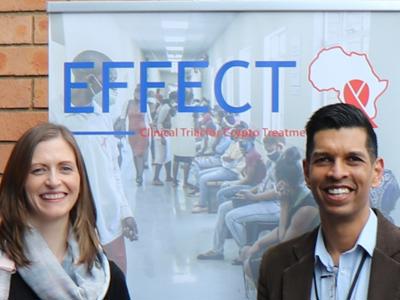Published: 19 July 2023
Researchers from St George’s, University of London and in South Africa, Tanzania and Vietnam are leading a new international clinical trial which aims to improve treatment to prevent a type of meningitis that attacks the brain in people with advanced HIV (or AIDS).
Meningitis caused by the Cryptococcus fungus is an infection of the membranes covering the brain and spinal cord, as well as the brain itself. The destructive condition is responsible for around 110,000 deaths globally every year and accounts for up to 20% of HIV-related deaths.
People with this type of meningitis often only have a short window left to live, with over half dying within 10 weeks even with treatment - a death rate similar to Ebola.
Focusing on prevention
Recent studies spearheaded by pioneering researchers at St George’s have revealed drugs to effectively treat cryptococcal meningitis, but they say attention needs to be brought forward in preventing the condition from developing in the first place.
Many people living with advanced HIV can be without symptoms for this type of meningitis but on the cusp of being very ill. Routine screening is now in place for people with advanced HIV to diagnose cryptococcal disease even before meningitis symptoms develop.
Now, thanks to £4.7m funding from the MRC Joint Global Health Trials, the EFFECT trial co-led by Dr Síle Molloy from SGUL and Professor Nelesh Govender from the University of the Witwatersrand/ National Institute for Communicable Diseases in Johannesburg, hopes to catch people living with the early stages of this fungal disease, before they develop cryptococcal meningitis, through routine screening appointments.

Recruiting across South Africa, Tanzania and Vietnam
The team will recruit 600 people to the trial in 13 different sites across South Africa, Tanzania and Vietnam who have the cryptococcal antigen in their blood – a red flag that shows they have the cryptococcal fungus but no meningitis. They will be randomised to receive either a combination therapy of fluconazole and flucytosine or the standard treatment (fluconazole alone) for two weeks. All participants will then be given a lower dose of fluconazole as per current guidelines.
Patients will be contacted over the next two weeks to ensure they are adhering to the medication and will be followed-up at one, two and a half, four and six months to determine changes in the number of deaths.
Catching people early at routine appointments
“This two-drug therapy is already powerful at treating cryptococcal meningitis, but we now need to take a step back and see if we can use it as a preventable treatment to save more lives.
“We hope catching people earlier at routine HIV screening appointments, and giving them the combination therapy much sooner, could pave the way to cut the number of HIV-associated deaths. If successful, this could lead to a change in guidelines, facilitating access to affordable, safe, and effective preventative treatment.”
- Dr Síle Molloy, co-Chief Investigator of the EFFECT trial and researcher at St George’s -
“Over the past five years, South Africa has screened more than one million people with advanced HIV to look for cryptococcal antigen in their blood. If the two-drug treatment works better than the standard, this could save thousands of lives in South Africa alone.”
- Professor Nelesh Govender, co-Chief Investigator of the EFFECT trial -
Learn more about the international research at St George's, University of London